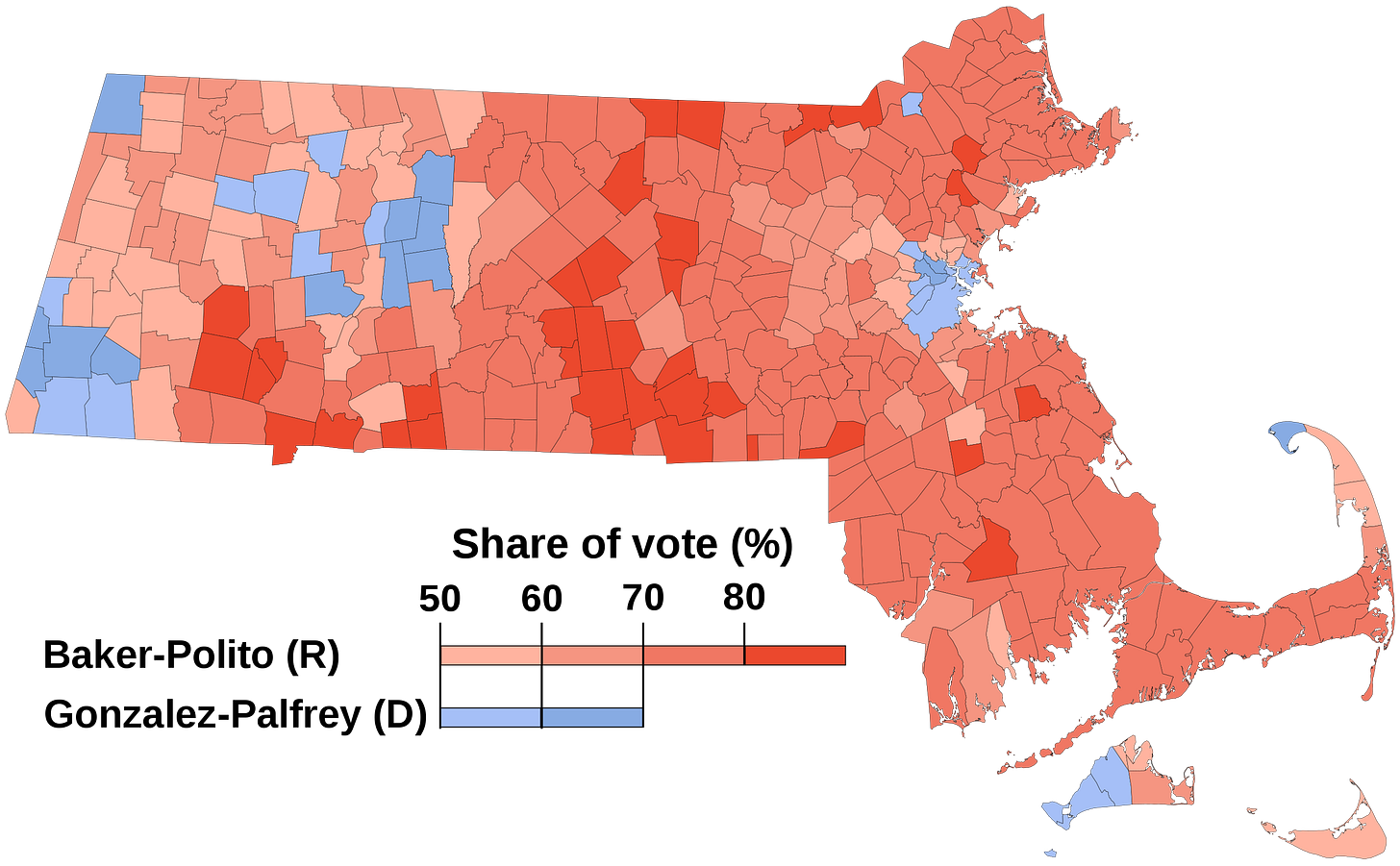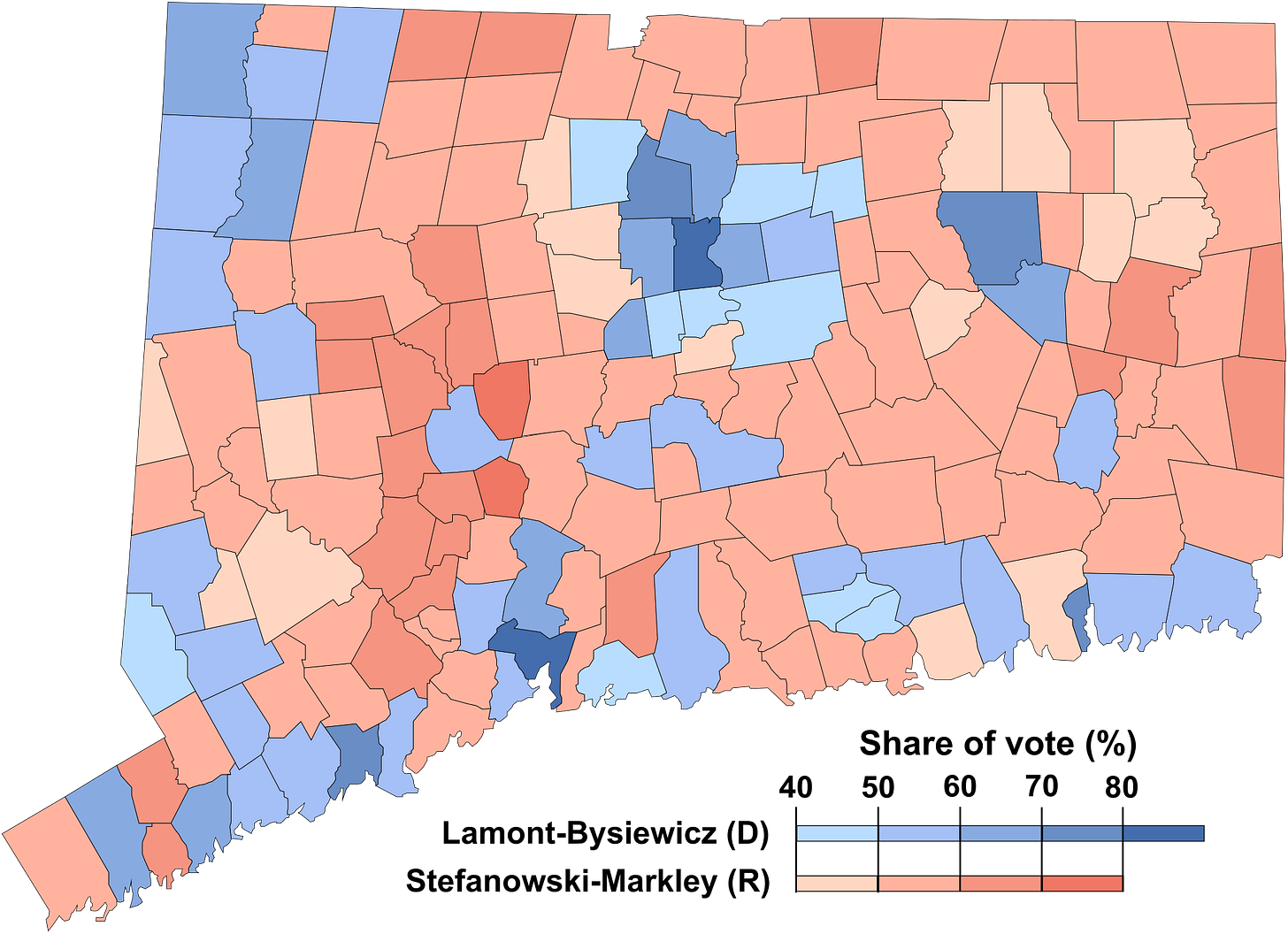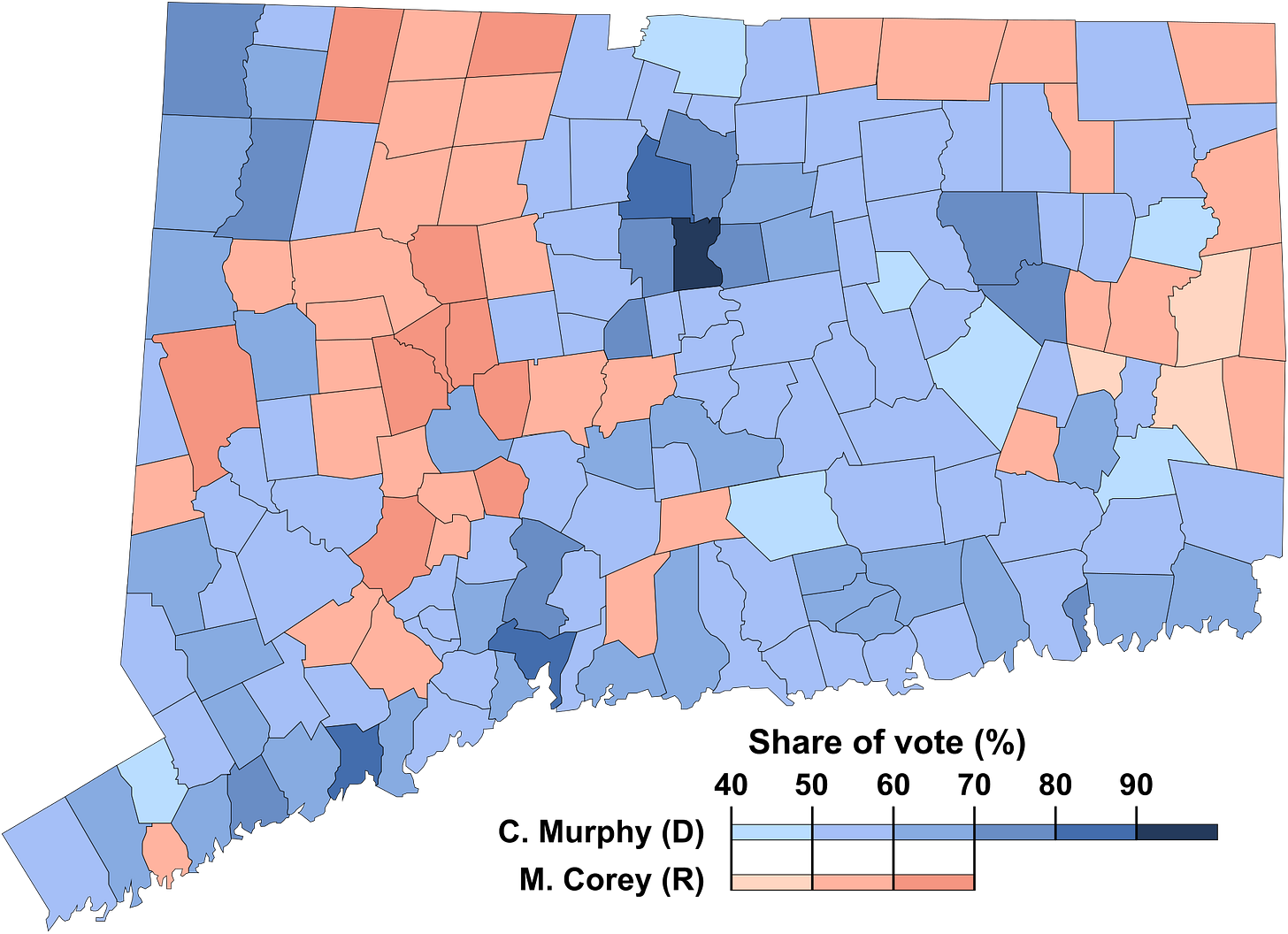"Baker Democrats" in Connecticut
Voters want someone to stand athwart the legislature, yelling "stop!"

One of the things I’ll have to think about next August as I prepare to move to New Haven is my voter registration. I plan to eventually switch my voter registration to Connecticut — I could continue to vote absentee in Massachusetts but I’m a strong believer in voting where I actually live — but the question is whether to do so before or after the midterms.
On the one hand, there’ll be a ballot question on a proposed ‘millionaire’s tax’ and a potentially close race for governor in Massachusetts. On the other hand, my vote would be more consequential in Connecticut. I’m a Democrat, and both states are solidly blue, but Massachusetts is bluer — it has a Cook PVI of D+14 compared to Connecticut’s D+7. I currently live in Massachusetts’ 7th congressional district, which has a PVI of D+35; at Yale, I’ll be in Connecticut’s 3rd, with a PVI of D+8.
All of this is to say that there is a higher (though still very low) probability that my ballot is the pivotal vote in Connecticut than in Massachusetts. Specifically, I believe that my vote will be more influential in the 2022 and 2026 races for Connecticut governor than in Massachusetts.
Big Baker Brand
Charlie Baker, the incumbent Republican governor of Massachusetts, first ran for the job in 2010 against then-Democratic Gov. Deval Patrick. He lost 48-42, with independent candidate Tim Cahill getting 8% of the vote. In 2014, with Patrick opting not to seek reelection, Baker ran again and beat Democratic nominee and then-Massachusetts Attorney General Martha Coakley 48-46 in a national environment that was favorable to the GOP.
Baker ran as a moderate and argued that he would serve as a check on the overwhelmingly Democratic legislature, similar to the argument Scott Brown made regarding the filibuster when running to fill Ted Kennedy’s Senate seat in 2010. The governor earned high approval ratings, was reelected with a landslide 67% of the vote in 2018, and is considered the man to beat should he run in 2022.

Now, there’s nothing unusual about a moderate Republican winning the governor’s mansion in a blue state by promising to stand athwart the Democratic legislature yelling “stop!” — Maryland’s Larry Hogan and Vermont’s Phil Scott also fit this role. In fact, it seems to be the archetype for Republicans who win statewide in New England by targeting generally liberal voters who nonetheless want to push back on the excesses of one-party rule.
And it’s a view that I’m somewhat partial to — while I’m not afraid of the prospect of a Democratic trifecta, I see Baker as someone who is willing to negotiate and compromise in good faith while giving constructive criticism that forces Democrats to improve their ideas. Plus, if push ever came to shove, the Democrats on Beacon Hill have more than enough votes to override his veto.
Back to Connecticut
As in Massachusetts, both houses of the Connecticut legislature are dominated by Democrats. The state has not voted for a Republican presidential candidate since 1988; Democratic candidates have carried the state by double digits since 2004. But in the 2006 midterms, the unelected GOP incumbent held the governor’s mansion 63-36. In the 2010 midterms, while his party was taking a shellacking nationwide, Democratic nominee Dan Malloy won the governor’s mansion by a margin of fewer than 7,000 votes. On the same day, Connecticut Attorney General Richard Blumenthal won Chris Dodd’s open Senate seat 55-43, overperforming Malloy by 12.5 points.
Malloy won a second term in 2014 by a larger margin of 2.5 points, but by the end of his term, he was the most unpopular governor in the country. Despite the national political environment favoring Democrats, current Gov. Ned Lamont won office by a narrow margin of 49.4-46.2 in 2018:

An independent candidate, former Republican Oz Griebel, earned 3.9% of the vote, leading to accusations of spoiling the race for the GOP. Incumbent Democratic Sen. Chris Murphy won a second term 59.5-39.4, outperforming Lamont by 16.9 points:

Now, some of this phenomenon of Republican overperformance can be chalked up to chance. The Democrats have had to run gubernatorial candidates during two midterms (2010 and 2014) with a Democratic president in office, where the national environment favors the GOP. And Lamont may have been a uniquely weak candidate despite the blue wave in 2018 — in New York magazine, David Freedlander described him as a wealthy businessman who changes his views with the political winds du jour.
But I think the primary reason why Republican candidates overperform is that Connecticut voters, like those in Massachusetts, want a check on the legislature.
What all this means for the midterms (and beyond)
The observation that moderate candidates are good at winning tough races is not exactly new nor particularly surprising. The strategy that a Connecticut Republican could use to win statewide office — sticking to popular issues and trying to draw attention to their opponents’ most unpopular stances — could be employed by a Democrat in North Carolina or Arizona.
And to the extent that the 2022 midterm environment is going to be favorable to the GOP due to backlash to President Biden, Ned Lamont is likely to face a tough reelection race. If the Connecticut Republican Party continues to nominate popular, moderate candidates, they’ll have a good shot at winning the governor’s mansion at some point in the near future.
But this is where Connecticut and Massachusetts differ: I doubt the MassGOP can pull off the same trick. In Connecticut, the Republicans actually have a shot at winning some offices even if Democrats maintain the upper hand, so the state party is more likely to attract people who are more interested in winning than religiously adhering to ideological orthodoxy or pleasing party activists.
Because the Bay State is much more reliably Democratic than Connecticut, the GOP is basically a non-factor in any major office aside from the governorship. The upshot of this is that many of the people who are serious about going into politics don’t start working for the MassGOP because they know that their future prospects are limited, leaving only the most dedicated, ideological conservative activists to run the state party. That’s why it vocally supports former President Donald Trump despite his deep unpopularity in Massachusetts while feuding with electable moderates like Baker.
If Charlie Baker chooses to run for reelection, I think he’s easily the favorite and is sure to give the Democratic nominee a run for their money. And I actually like Baker! While I plan to wait and see what policies he and his opponent end up proposing and evaluate them on that basis, I’m keeping an open mind and could see definitely myself voting for the governor.
But Baker is one of a kind, and when he eventually retires I’m not sure that the MassGOP will be able to find another candidate like him. Against any other Republican opponent, the generic Democrat is probably a shoo-in simply on account of my home state’s partisanship. The same can’t be said for Connecticut — which is why I’m leaning toward switching my registration before the midterms.



